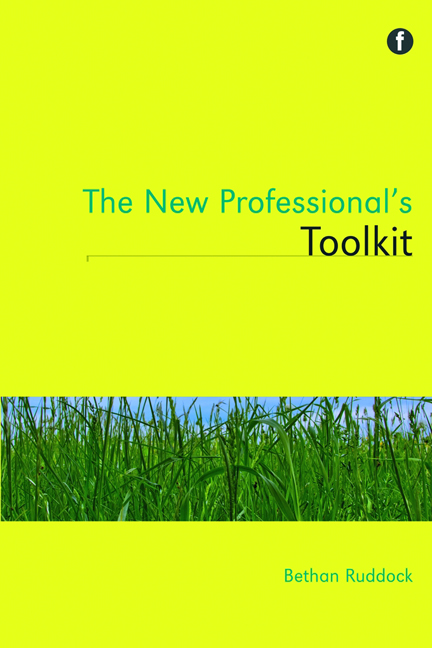Book contents
- Frontmatter
- Dedication
- Contents
- Preface
- Acknowledgements
- Glossary
- Introduction
- 1 Project management
- 2 Teaching, training and communicating
- 3 Meeting your users' needs and measuring success
- 4 Marketing your service and engaging stakeholders
- 5 Using technologies
- 6 Getting and staying online
- 7 Generating funding and doing more with less
- 8 Managing money, budgets and negotiating
- 9 Information ethics and copyright
- 10 Upskilling and professional development
- 11 Networking and promoting yourself
- 12 Professional involvement and career development
- Conclusion
- Appendix: Budgeting example spreadsheet
- Index
- Frontmatter
- Dedication
- Contents
- Preface
- Acknowledgements
- Glossary
- Introduction
- 1 Project management
- 2 Teaching, training and communicating
- 3 Meeting your users' needs and measuring success
- 4 Marketing your service and engaging stakeholders
- 5 Using technologies
- 6 Getting and staying online
- 7 Generating funding and doing more with less
- 8 Managing money, budgets and negotiating
- 9 Information ethics and copyright
- 10 Upskilling and professional development
- 11 Networking and promoting yourself
- 12 Professional involvement and career development
- Conclusion
- Appendix: Budgeting example spreadsheet
- Index
Summary
Welcome to the 21st century, where information professionals roam the land. You can find these adaptable creatures in almost every evolutionary niche: health, education, banking and finance, law, the IT industry, government (national and local), schools, universities. Their camouflage skills are excellent; they are often no longer distinguishable by their titles of ‘librarian’ or ‘archivist’, instead merging seamlessly with their new environments with titles such as ‘transformation manager’, ‘knowledge strategist’ and ‘content expert’.
With such a diverse population, it can be hard to pick out distinguishing characteristics that identify information professionals as members of the same tribe. Cardigans, buns and spectacles are no longer considered reliable indicators. Researchers who have spent time close to the tribe claim that the only distinguishing physical characteristic is a certain liveliness, intelligence and curiosity around the eyes. Even in conversations, it is not always possible to spot a well assimilated information professional. They will use the same value terms and keywords as others in their surrounding environment, and will easily pick up on the argot or jargon of their local community.
It is astonishing to think that the vast majority of these information professionals sprang from a relatively limited number of training institutions: library schools as they are often called. One of the continuing mysteries surrounding information professionals is how a generic course, usually lasting no longer than a year or two, can produce so many information professionals who thrive in specialized environments. In fact, new research suggests that much of the development of the information professional takes place in the wild (or on the job), and it is rumoured that one reliable method of identifying information professionals is to search their conversations for the presence of the mysterious phrase, ‘I bet you didn't learn that in library school.’
If these indications are correct, then we must accept that there is considerable scope within the information professions for continuous professional development (CPD): self-education, which begins where the more formal library school training left off. Many methods and forms for this CPD have been posited; we have definite evidence of training courses and conferences. These can be distinguished from non-information professional conferences by the nature of the queer plastic objects known as freebies left behind. We also know of the existence of professional organizations, where information professionals could relax in the company of their own kind.
- Type
- Chapter
- Information
- The New Professional's Toolkit , pp. xi - xiiPublisher: FacetPrint publication year: 2012



